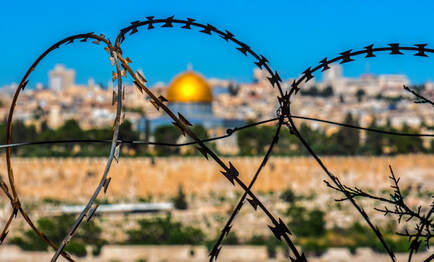
For those of us engaged in interreligious dialogue this is both a desire and struggle, especially now when the war in Israel and Gaza leads to polarisation even in a country as far away from the Middle East as Scotland. People have their own loyalties, their own versions of where the truth lies, their own suggestions on how to bring peace to that troubled land. But what seems to be lacking is a willingness to listen to the story of someone on ‘the other side’ so to speak. The horror of the destruction of Gaza, the killing of innocent people, women and children, the devastation of its towns and villages, the intense grief of those left alive that is played out daily on our television screens is enough to soften the hardest heart and has led thousands of people to march and call for an end to the war. Many of the demonstrators march under a pro-Palestine banner which might suggest that being pro-Palestine means being anti-Israel (and vice versa) and sometimes to be anti-Israel is to be anti-Jewish as is seen by the rise of incidents of antisemitism. For many Jews Scotland has become a frightening place and some are afraid to venture far from home. People seem to have forgotten the two hundred hostages being held by Hamas or the fear and terror of an attack that was reminiscent of the Holocaust.
There are wrongs on both sides and it would seem to me that ordinary people – Palestinians and Israelis are at the mercy of right-wing governments with their own ambitions, one to rid Gaza of Hamas and the other to rid Israel of Jews. And our Jewish, Muslim and Christian communities are caught up in this because many of them have connections and loved ones in what we all call the Holy Land, and we all feel powerless. What can we do? We can honour the pain and agony of the situation to use Joanna Macey’s words and we can continue our work of interreligious dialogue. We can condemn the brutality on both sides of this conflict and speak out for peace. We can show that there are two stories, two people traumatised by their past experience. We can show and support all those Palestinians and Israelis working together for peace. If only the demonstrations for peace carried both the Palestinian and the Israeli flags, held banners asking for a cease fire and calling those in authority to dialogue to find peaceful ways of co-existing. Then we would know we were united in our desire for peace.
There is a role here for the interfaith community – not to take sides but to try to bring Christians, Muslims and Jews together, to listen to one another’s story, concerns, fears. Can we here in Scotland accept the right of all Palestinians and Israelis to live in peace, can we share our common grief at the pain and horrors that are whether we like it or not connected to our faiths, can we share our longing for peace and our determination that the violence and conflict in the Middle East will not affect good relations here? In this way we could be prophetic, we could witness that good relations between people of different faiths and opinions is possible. This will not solve the situation in the Middle East, that has to lie with governments and the international community but at least we can resolve not to make the situation worse by polarising here in Scotland and our attempts at peace here at home might give us some hope and a sense of doing something rather than nothing.


 RSS Feed
RSS Feed
